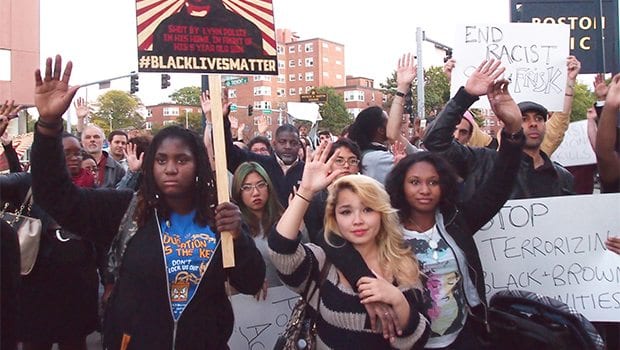
Following the release of a report detailing a disproportionate number of blacks stopped, frisked, interviewed or under surveillance by Boston police, a coalition of civil rights groups is demanding that the police department adopt reforms to protect the civil liberties of Bostonians.
The newly-formed Boston Coalition for Police Accountability called on police to outfit officers with body-worn cameras, provide receipts for all persons stopped by officers with the officer’s name and reason for stop and to post data on police stops on the department’s website.
“This data belongs to the public,” said Carl Williams, staff attorney for the ACLU of Massachusetts, speaking during a rally in front of the Boston Police headquarters.
The police are considering the coalition’s recommendations and other ideas, according to Superintendent-in-Chief William Gross.
“We are researching body cameras, receipts, all of that,” he said, speaking to reporters during the rally. “We never threw any of that off the table.”
Boston police routinely observe, question, stop, frisk and search people. The data from such encounters is entered into the department’s Field Interrogation and Observation database. Police use the database to track criminally-involved individuals.
That data showed that blacks made up a disproportionate number of those observed, stopped, questioned, frisked or searched by police — 63 percent — despite making up only 24 percent of the city’s population. Conversely, whites, who make up 47 percent of the city’s population, were stopped only 22 percent of those stopped by police.
ACLU staff note that the police gave little justification for why individuals were targeted by police, listing “investigate a person,” as the reason for 75 percent of the entries in the FIO database.
In only 2.5 percent of the listed 204,000 stops or investigations was contraband recovered, suggesting police are casting a wide net, but yielding little in the way of arrests.
Police initially reacted to the release of the report by noting that the data was old, and claimed that gang membership and prior criminal record increased the likelihood that a person would end up being stopped, questioned or observed by the police.
“The study showed that officers are repeatedly stopping or observing individuals with criminal records and/or gang membership (5% of the individuals FIO’ed account for more than 40% of the total FIO’s),” reads an entry in the Police Department’s blog.
The ACLU report covers data the BPD turned over from the years 2007 to 2010, but police have not released data for 2011 through 2013.

Superintendent In Chief William Gross speaks to reporters outside police headquarters.
At the rally last week, members of the Boston Coalition for Police Accountability and Superintendent-in-Chief Gross spoke to reporters, giving differing analyses of the ACLU report.
Gross told reporters that the data, now three years old, is outdated.
“It’s a new mayoral administration,” he said. “It’s a new police administration.”
In recent years, the department has instituted trainings in the police academy to teach officers how better to relate to members of the black community and has revised its rules and regulations pertaining to field interrogations, according to Gross.
Rahsaan Hall, deputy director of the Lawyers Committee for Civil Rights and Economic Justice, questioned how much the department could have changed in three years.
“Even though it may be old data, it’s not ancient data,” he said. “Some of those officers who were out on the street doing those racially targeted stops — they’re still out there now.”
Gross said the police remain open to any criticism.
“We do have great relationships with the community, with the black clergy, with black elected officials,” he said. “When things come to our attention, fine. Let’s address it. The young men and women of the community, if they have problems, let’s address them. This is not like other cities that are going through turmoil. If have a beef, they can come and talk to us.”


![Banner [Virtual] Art Gallery](https://baystatebanner.com/wp-content/uploads/2024/04/Cagen-Luse_Men-at-store-e1713991226112-150x150.jpg)



